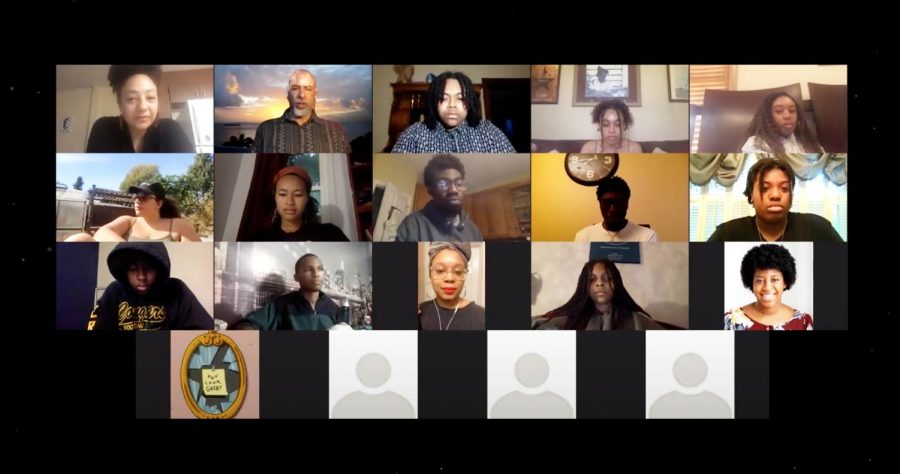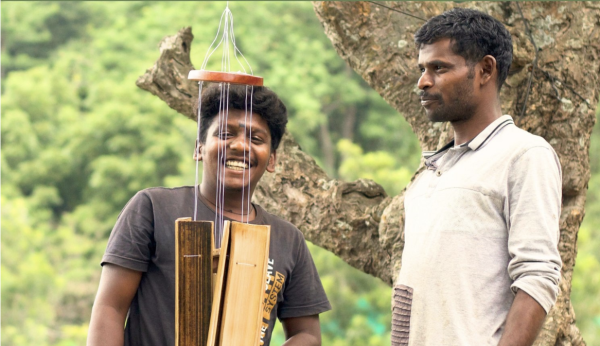“Boxes Will Be Provided” Challenges Oberlin to Do More For Black Students
Courtesy of DaQuan Williams, OC ’20
Afrikan Heritage House faculty and residents hold an Umoja meeting over Zoom, as shown in the documentary “Boxes Will Be Provided.”
When the College moved to remote learning this past spring, students enrolled in the Historic and Contemporary Debates in African American Education course knew they had to document the experience. Their documentary Boxes Will Be Provided felt like a necessary step in recording the impact of COVID-19 on Black Obies.
Director and editor DaQuan Williams, OC ’20, had very little experience in film-making prior to embarking on this project, which clocks in at roughly two and a half hours and involves over 10 students. While the documentary seeks to provide information on COVID-19 and the life and history of Black Obies, its primary goal was to provide much-needed space for students to openly voice their thoughts and concerns.
“I wanted to show the diversity in the Black community, and what we have to deal with … and how that identity transfers into different sectors of society and different sectors of Oberlin,” Williams said.
The vlog-like structure of the documentary lends itself to an informal atmosphere for students to speak candidly on their respective experiences in the wake of the COVID-19 pandemic and the transition to remote classes. Williams used favorite online documentaries as a learning tool and an aesthetic influence.
“While I was editing, I was mostly watching short films and videos on YouTube to get some inspiration on how to edit,” he said.
Boxes Will Be Provided was assistant producer Malaika Djungu-Sungu’s first experience with film. A rising College third-year, Djungu-Sungu guided the interviews for the production, took part in a few interviews herself, and helped develop the film’s structure.
“When you’re doing a project like that, it’s kind of easy to go interview other people and subconsciously separate yourself from the issue that you’re very much a part of,” Djungu-Sungu said. “Being interviewed myself reminded me that, ‘Oh, this is happening to me as well.’”
The disproportionate effect of COVID-19 on the Black community — both within and beyond educational institutions — was, in some ways, a catalyst for the most recent wave of the Black Lives Matter movement. Making a collaborative documentary in this national setting, rather than writing individual research papers, helped bring the class together in the process of producing the documentary.
“Toward the end, we were really helping each other,” said executive producer Darian Gray, OC ’20.
The Afrikan Heritage House, also known as Lord-Saunders, is a salient feature of the documentary. A-House was built in 1968 with the goal of providing a safe, familial space for Oberlin students of African descent. Most students involved in the production were residents of A-House, and spoke to its importance in the lives of Black students at Oberlin. The space created and maintained within A-House has long engendered communal well being for Black students on Oberlin’s campus — many students featured in the documentary stated that this will be one of the greatest losses of the upcoming socially distanced semesters.
This past spring semester, the absence of A-House’s physical community was somewhat relieved by virtual Soul Sessions and Umoja meetings, led on Zoom by Associate Professor of Theater and Africana Studies Justin Emeka, OC ’95, and Director and Faculty in Residence of the Afrikan Heritage House Candice Raynor.
“It’s important to keep in mind that we’re part of a longer legacy,” Emeka said in an Umoja Zoom session featured in the documentary. “Our education here is a part of a longer legacy. As fearful as COVID is, I don’t think it’s more fearful than white supremacy. We know scientifically COVID is gonna pass. But it’s been 400 years, and we haven’t figured out a cure for white supremacy.”
Boxes Will Be Provided reflects on the College’s past, present, and future through critical discussion of home, social, and academic experience of Black students at Oberlin. Although the College has a long and lauded history of progressivism, the documentary points out that there is still ample room for growth and change.
“I would hope that Oberlin does more to facilitate those discussions, especially in the midst of everything going on,” Gray said. “Things are changing, and Oberlin can either be progressive in the ways they’ve always wanted to or they can stay behind the curve. And I think that decision is going to depend on how they treat this upcoming year for sure.”
Williams, Djungu-Sungu, and Gray all agree that diversity training for faculty and the hiring of more Black faculty members are immediately necessary. These measures are among the list of 21 demands that ABUSUA, Oberlin’s Black Student Union, released in mid-June.
“Oberlin has to understand that Black students occupy different spaces on campus,” Williams said. “It takes that much more effort to ensure that the institution is making more effort to accommodate Black students, and to make sure that we are not only excelling academically but socially.”
Boxes Will Be Provided is currently available to stream on YouTube.











